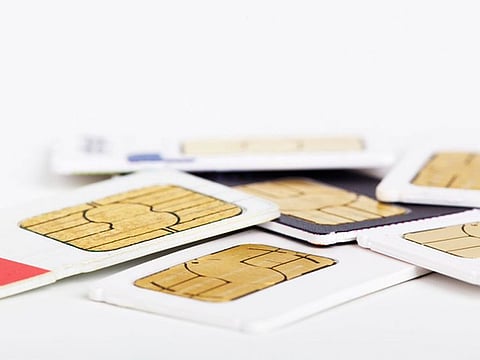Philippines: SIM card registration bill approved, due for President Marcos' signature
Legislation aims to curb fraud, unmask criminals using unregistered mobile numbers

Manila: The Philippine House of Representatives (lower house) has approved on Wednesday (September 28, 2022) the bicameral conference committee reports on a bill requiring the registration of subscriber identity module (SIM) cards in the Asian country.
The senate approved the bill on Tuesday (September 27).
SIM cards costs a dime a dozen and are currently not required to be registered in the Philippines, a fact exploited by many to use them for fradulent purposes.
The House approved, via show of hands (viva voce), the bicameral version that harmonises House Bill No. 14 and Senate Bill No. 1310, which require all phone users in the country to register their SIM cards before using them.
As per the proposed law, all public telecommunications entities (PTEs) are required to register SIM cards as a prerequisite to their sale and activation.
PENALTIES
The House of Representatives’ approved version imposes fines ranging from Php5,000 ($84) to Php1 million (about $16,960) on telecom service providers, their authorised SIM card sellers, and government workers who will fail to comply with the law.
On Tuesday, senators present during the chamber's 25th regular session voted to ratify Senate Bill 1310 or the Subscriber Identity Module (SIM) Card Registration Act.
Senator Grace Poe, chair of the Committee on Public Services, thanked her 19 colleagues for approving the measure.
She also cited Senate Minority Leader Aquilino Pimentel III and Senator Pia Cayetano for their relevant amendments.
"Finally, meron na tayong magagawa (we can do something) aside from just ignoring, deleting, or blocking the numbers with fraudulent or spam messages," Poe said in her privilege speech.
79 million smartphone users
In 2020, there were approximately 79 million smartphone users in the Philippines, reflecting an upward trend since 2017. It is estimated that by 2025, there would be around 91.5 million smartphone users in the country.
Unmask criminals hiding in SIM anonymity
"We now have in our hands the means to unmask the criminals who have been hiding for so long under the protection of anonymity and to bring them to justice," she added.
Senate Bill 1310 aims to curb mobile phone and electronic communication-aided crimes by requiring all mobile phone users to present valid government-issued identification and documents in registering their SIMs or eSIMs.
Telecommunications companies (telcos) will be mandated to protect subscribers’ personal information under the regulation of the Department of Information and Communications Technology.
If President Ferdinand Marcos Jr finds nothing objectionable in the final version of the bill and signs it, it becomes a law after being published in the official Gazette.
Vetoed
In April, then-President Rodrigo Duterte has vetoed the legislation after approval by both chambers of Philippine Congress which sought to mandate the following: (1) registration of all SIM cards, and (2) all social media accounts in the country. Duterte objected to the latter, and sent the bill back to Congress.
In January, an industry group reported that credit card fraud cases jumped 21% in the Philippines— which they blamed on “SIM card swap" schemes.
Credit Card Association of the Philippines (CCAP), which groups 18 major credit card service providers in the country — urged Globe Telecom and Smart Communications, as well as the National Telecommunications Commission (NTC) and the House of Representatives, following reports of “experiencing high volumes of fraud cases causing financial detriment.”
CCAP said the “Virtual Account Take Over” scam had the highest number of incidents. The scam involves taking over and gaining access to the one-time passwords (or OTPs) of customers, enabling criminals to perform OTP-validated online transactions.
Moreover, SIM swap fraud cases have emerged in different parts of the world, including the Philippines.
Sign up for the Daily Briefing
Get the latest news and updates straight to your inbox


